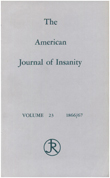Psychiatric consequences of "ethnic cleansing": clinical assessments and trauma testimonies of newly resettled Bosnian refugees
Abstract
OBJECTIVE: The authors describe the psychiatric assessments and trauma testimonies of 20 Bosnian refugees of "ethnic cleansing" who have recently resettled in the United States. METHOD: Refugees referred from agencies managing refugee resettlement underwent systematic, trauma- focused, clinical interviews that included standardized assessment scales. RESULTS: The traumatic experiences of ethnic cleansing in these Bosnian refugees were genocidal in nature. The number of types of traumatic experiences correlated positively with age. Posttraumatic stress disorder (PTSD) was diagnosed in 65% of the refugees, and depressive disorders in 35%. PTSD severity scores were correlated with the number of types of traumatic events experienced. CONCLUSIONS: Ethnic cleansing has caused high rates of PTSD and depression, as well as other forms of psychological morbidity, in this group of resettled Bosnian refugees. The longitudinal sequelae of ethnic cleansing as a form of massive psychic trauma remain to be studied.
Access content
To read the fulltext, please use one of the options below to sign in or purchase access.- Personal login
- Institutional Login
- Sign in via OpenAthens
- Register for access
-
Please login/register if you wish to pair your device and check access availability.
Not a subscriber?
PsychiatryOnline subscription options offer access to the DSM-5 library, books, journals, CME, and patient resources. This all-in-one virtual library provides psychiatrists and mental health professionals with key resources for diagnosis, treatment, research, and professional development.
Need more help? PsychiatryOnline Customer Service may be reached by emailing [email protected] or by calling 800-368-5777 (in the U.S.) or 703-907-7322 (outside the U.S.).



